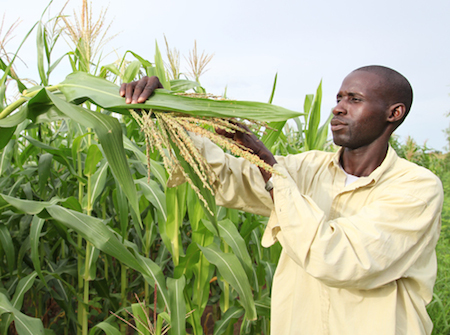
BONN, Germany (PAMACC News) – Investors have been beckoned to turn attention to agricultural climate action to support the sustainable livelihoods of small-scale farmers.
The drive is seen as pathways to unlock much greater potential to curb emissions and protect people against climate change, experts said at the ongoing UN Climate Change Conference in Bonn.
German government officials said it was time to invest faster, wider and further in agriculture to give small scale farmers a voice and potential to fight against climate change.
“Agriculture is a key factor for the sustainability of rural areas, the responsibility for food security and its potential to offer climate change solutions is enormous,” Christian Schmidt, Germany’s Federal Minister of Food and Agriculture, said during the session opening.
Different speakers at the session agreed that it was time for investors and governments to direct far more resources to the agriculture sector as a key strategy to meet the goals of the Paris Climate Change Agreement and the inextricably linked 2030 Agenda for Sustainable Development.
“Countries now have the opportunity to transform their agricultural sectors to achieve food security for all through sustainable agriculture and strategies that boost resource-use efficiency, conserve and restore biodiversity and natural resources, and combat the impacts of climate change,” said René Castro, Assistant-Director General of the UN Food and Agriculture Organisation (FAO).
For the livestock sector, for example FAO estimates that emissions could be readily reduced by about 30 percent with the adoption of best practices.
Extreme climate impacts also disproportionately affect small-scale farmers, pastoralists and fishing and forest communities who still provide the bulk of the planet’s food. Supporting these communities with innovative solutions both to reduce their emissions and protect their communities also meets many of the objectives of literally every one of the 17 Sustainable Development Goals.
So far, FAO has released a new Sourcebook on Climate-Smart Agriculture detailing some actions needed to transform the agriculture sector. The book, launched at the event, features knowledge and stories about actual projects to guide policymakers and programme managers to make the agricultural sectors more sustainable and productive while also contributing to food security and lower carbon intensity.
The Climate and Clean Air Coalition (CCAC), an organizer of the Agriculture Action day announced they will work in the next few years to create the conditions for greater agricultural climate action. They aim to help give countries the confidence to set realistic yet ambitious targets through the next revision of their national climate plans – Nationally Determined Contributions.
“Agriculture is a large source of powerful greenhouse gases like methane and other short-lived climate pollutants but has great potential to store carbon and reduce greenhouse gases in our lifetime, that’s why we support and advocate for countries to improve their livestock emissions inventories,” said Helena Molin Valdes, Head of the CCAC Secretariat.
A number of other agriculture-based solutions for addressing climate change were also presented at the event. Discussions involved participants from governments, civil society, the private sector, small scale and young farmers centered on livestock, traditional agriculture systems, water, soil, food loss and waste, and integrated landscape management.
Among the recommended actions and initiatives were; scale up of public and private climate finance flows to agriculture, and use them in a catalytic manner. Climate finance flows continue to favour mitigation over adaptation, and focus overwhelmingly on energy systems and infrastructure.
Another recommendation was to incentivize public-private partnerships. Strong dialogue and collaboration between the public and private sectors is key to ensure alignment between public policy and private sector investment decisions in agriculture and throughout the entire food system.
There is also need for a strengthened multi-sector and multi-stakeholder dialogue towards more integrated approaches. Integrated approaches to landscape management will require enhanced coordination of policy and climate action across multiple public and private entities.
It is also important to invest in knowledge and information. Additional analyses are needed to better identify the institutional barriers and market failures that are inhibiting broader adoption of climate-resilient and low-emissions agricultural practices in individual countries, regions and communities.
Lastly, it was noted that agricultural producers require additional capacities to understand the climate risks and vulnerabilities they face from day to day, season to season.












